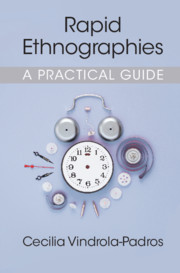Book contents
- Rapid Ethnographies
- Rapid Ethnographies
- Copyright page
- Dedication
- Contents
- Figures and Tables
- Vignettes
- Case Studies
- 1 Introduction
- 2 Key Debates in the Field of Rapid Ethnographies
- 3 A Brief History of the Work Prior to Rapid Ethnographies
- 4 Rapid Ethnographies as a Lone Researcher
- 5 Team-Based Rapid Ethnographies
- 6 Ethics, Practical Considerations and the Emotional Labour of Rapid Ethnographic Fieldwork
- 7 Dissemination and the Use of Findings
- 8 The Future of Rapid Ethnographies
- Book part
- Further Reading
- References
- Index
6 - Ethics, Practical Considerations and the Emotional Labour of Rapid Ethnographic Fieldwork
Published online by Cambridge University Press: 26 November 2020
- Rapid Ethnographies
- Rapid Ethnographies
- Copyright page
- Dedication
- Contents
- Figures and Tables
- Vignettes
- Case Studies
- 1 Introduction
- 2 Key Debates in the Field of Rapid Ethnographies
- 3 A Brief History of the Work Prior to Rapid Ethnographies
- 4 Rapid Ethnographies as a Lone Researcher
- 5 Team-Based Rapid Ethnographies
- 6 Ethics, Practical Considerations and the Emotional Labour of Rapid Ethnographic Fieldwork
- 7 Dissemination and the Use of Findings
- 8 The Future of Rapid Ethnographies
- Book part
- Further Reading
- References
- Index
Summary
It includes a discussion of ethical governance processes, arguing that, even though studies must be carried out quickly, the same ethical principles as those of long-term studies must be followed (i.e. informed consent, do no harm, confidentiality and anonymity). It presents a few strategies for streamlining the review of applications for ethical approval, showing examples of ethical review committees around the world that have established quicker and simpler review processes for studies that are low risk and time-sensitive. The chapter reviews a series of rapid tools and techniques currently used in qualitative research to reduce the amount of time required for data collection and analysis. These tools and techniques include bypassing the use of transcripts by analysing directly from interview recordings, using selected transcription or speeding up the development of transcripts through on-site scribes or voice-recognition software. The chapter also includes a brief description of the emotional labour involved in rapid ethnographic research.
Keywords
- Type
- Chapter
- Information
- Rapid EthnographiesA Practical Guide, pp. 81 - 93Publisher: Cambridge University PressPrint publication year: 2021

